- Home
- David Pilling
Siege of Rome Page 2
Siege of Rome Read online
Page 2
“Good evening, Coel,” said Narses, his ugly face stretched into a smile, “you are fully recovered, I hope. Hardy barbarian stock, eh?”
He was not a welcome or pleasant sight. The last time I was summoned into the presence of Narses and Belisarius, they had coerced me into accompanying the Roman expedition to North Africa, so I could help steal Caledfwlch from Gelimer, the mad King of the Vandals.
After my return to Constantinople, Narses had rescued me from being boiled alive by Theodora’s assassins. I should have felt grateful to him for that, but he was a skilled and subtle politico, and not the sort to do anything except for his own profit. By saving me he offended and humiliated the Empress, and thus reduced her influence.
He was dwarfish little monstrosity, hardly bigger than a child, limping his way through life on a pair of twisted legs. God had seen fit to bring Narses only half-formed into the world. His physical afflictions were offset by an agile brain and burning ambition, and he had risen high in the world through sheer force of will and intellect. Anyone who judged the dwarf on his feeble appearance did so at their peril.
“My lords,” I said, with a stilted bow.
The three men had been sitting in silence when we entered, and the air fairly crackled with the tension between them. Belisarius and Mundus were allies and friends, of a sort, but both distrusted Narses. For good reason: the eunuch once cheerfully informed me that anyone who trusted him was a fool, and deserved an early grave.
For all his ugliness, Narses had acquired a certain degree of practiced charm. He rose, or rather dropped, from his seat, and patted the cushion next to his, inviting me to sit.
“Dismissed,” growled Mundus, waving away the Huns. They stamped their feet, turned smartly and marched outside. The slave closed the doors behind them and melted into the shadows.
“Wine for the champion of the arena,” said Narses, waddling over to the low table beside his couch, “wine for the latest hero of Rome.”
Embarrassed, I limped over to the couch and sat, while Narses poured out a rich, red flow from an elegantly fluted silver jug. He handed me the cup and regarded me with something like affection.
“You did splendidly in the arena,” he said, “Theodora’s face was sheer artistry for days afterwards. I have seldom seen her so enraged.”
He sighed happily. “Bliss to behold, I assure you, though I doubt her servants would agree. Their lives have been hell, ever since you plunged your magic sword into Leo’s heart.”
In truth Leo had fallen onto the blade, but now was not the time to quibble. “I am sorry for that,” I replied cautiously, “I never meant to cause any suffering. I have never done anything save follow my conscience.”
Belisarius had been watching me closely. “No man who listens to his conscience can thrive for long in this city,” he said, “it is a pit of snakes. The sooner we are gone, the better.”
Narses smiled indulgently. “Our famous general is too good for politics,” he said, winking at me, “in his world, honest men with swords defend the frontiers of the Empire, while corrupt eunuchs and former prostitutes do their best to undermine the state from within. Where is your wife tonight, Flavius?”
Belisarius’ jaw tightened. He clearly despised Narses, but for some unfathomable reason had invited the eunuch to his house.
“You know very well,” he replied, with forced patience, “Antonina was summoned to the palace tonight.”
“As she is most nights. Antonina and Theodora hatch plots together in the Empress’s private quarters, while we do the same here. Does the Emperor plot, I wonder? And if so, with whom?”
Mundus shifted impatiently. “I came here to talk of the war,” he grunted, “not to chop words and exchange clever insults. I see no reason why we could not have met in open council during the day, instead of creeping about like a pack of thieves in the dark.”
“He is the reason,” said Narses, pointing at me, “and that pig-sticker he carries.”
I touched the hilt of Caledfwlch, which I had strapped on before leaving the sanatorium. Having gone to such lengths to retrieve my grandsire’s sword, I never let it out of my sight.
“Show us the sword, Coel,” ordered Belisarius. He spoke with the voice of stern authority, and almost without thinking I drew Caledfwlch from its sheath.
Mundus lent forward and squinted at the blade as I held it up to the light. “I see an old-fashioned gladius,” he said, “with two golden eagles stamped in the hilt.”
“Caesar’s sword,” Narses explained, “wielded by old Julius himself, and said to have been forged by Vulcan himself in the depths of Mount Olympus. Lost in the mists of Albion for centuries, until it fell into the hands of Coel’s ancestor. Some grubby warlord or other.”
He hesitated, snapping his fingers and pretending that he had forgotten my grandsire’s name. The eunuch loved to play-act and provoke others. Once, I might have fallen for the bait, but was too canny to snap at it now.
“Arthur,” I said calmly, taking a long swallow of the excellent wine, “his name was Arthur.”
“Just so,” said Narses, smiling sweetly at me, “not just any sword, but a symbol and an icon of rare power. Gelimer would have used it to unite the barbarian nations of the world under his banner and destroy the Empire. It must never fall into the wrong hands.”
He held out his right hand, palm upwards. “Give it to me.”
I slammed Caledfwlch back into its sheath. “Never. That is one order I cannot obey. I will die first.”
“Coel speaks the truth,” said Belisarius, “I tried to persuade him to give it up in Carthage. He refused. The sword is part of him.”
Narses responded to defeats by pretending they hadn’t happened. “I merely tested you, Coel,” he said, lowering his hand, “you are every bit as brave and honest as I feared. But you must not stay in Constantinople. Your enemies multiply.”
He snapped his fingers, and a slave emerged from a shadowy corner, carrying a dark blue woolen cloak scarce big enough to fit a child. He draped it over Narses’ lumpen shoulders.
“I take my leave,” said the eunuch, “thank you for your hospitality, Flavius. An excellent supper. I must return the favour sometime.”
“I look forward to it,” Belisarius replied without a hint of sincerity. He and Mundus rose and bowed respectfully as Narses limped out of the room, followed by his slave.
When the doors had closed, Belisarius subsided gratefully onto his couch and stretched out his long legs. All the strain and tension in the air dissolved.
“Thank God for that,” he groaned, passing a hand over his face, “if the little swine had stayed much longer, I might have thrown him out of the window.”
“Why did he come, anyway?” demanded Mundus, “he talked of nothing but trivialities over supper. Every time I mentioned Italy, he changed the subject.”
Belisarius nodded at me. “Narses used our tame Briton to humiliate Theodora, but not had seen him since he was carried from the arena. I made sure of that. He wanted to know if Coel was still alive and whole, and if he could still be used. Now he knows.”
Mundus’s little eyes raked over me. “Your enemies multiply, Briton,” he said, “Narses referred to himself. You should have given him the sword.”
“It is mine, sir,” I said defensively, “all I have in the world. Without Caledfwlch I am nothing.”
“Narses will take it from you, if he can,” said Belisarius, “I know that scheming little imp. He craves power, spends every waking hour thinking of ways to obtain it. With Caesar’s sword in his hand, there would be no limit to his ambition. Can you imagine him perched on the throne?”
For the first time in weeks I laughed. The effort hurt my jaw, but I was glad of something to lift the clouds gathering over my head.
Belisarius and Mundus spent the next hour discussing the war. I listened avidly.
Justinian had hatched a plan whereby the Romans would attack Italy on two fronts. Mundus would lead the army west and inva
de Dalmatia, which was held by the Goths, hoping to leech the strength of the enemy by forcing them to defend their eastern province. Meanwhile Belisarius and the Roman fleet would sail south-west, officially to reinforce the Roman garrisons in Africa, but in fact to seize the island of Sicily.
“Sicily will be our stepping-stone to the Italian mainland,” said Belisarius, “our forces shall be likened unto a spear, thrust into her soft underbelly.”
He grinned at my expression. “Well, that is how the Emperor put it. He is something of a poet, and can turn a decent phrase on occasion.”
“What do you make of our plan?” he asked, again watching me closely. I seemed to fascinate these Romans, who regarded me as a relic from some distant world. Their forefathers had lost control of Britain generations ago, and I sometimes wondered if my presence served as a reminder - not always a welcome one - of the diminished Empire’s glorious past.
I pondered before answering. By now I was well into my third cup of wine, but even the heady glow of alcohol failed to fill me with optimism.
“If you can conquer North Africa with a mere fifteen thousand men, sir,” I said carefully, “then you can certainly repeat the feat elsewhere.”
“A shame, then,” said Belisarius, “that I won’t have fifteen thousand men. The Emperor has given me no more than twelve thousand for the task. Four thousand foederati troops, three thousand Isaurians, some Hunnish and Moorish cavalry, and my bucelarii.”
My spirits sank. How many warriors could the King of the Goths muster – forty, fifty thousand? And he could call on the support of his kin in Frankia, Hispania and Germania. If I was of a paranoid disposition, I might have suspected the Emperor of deliberately sending Belisarius to his death.
Yet my only chance of survival was to accompany this suicide mission. With the likes of Narses and Theodora for enemies, my life in Constantinople was not worth a straw.
“Twelve thousand men,” I said, “and one Briton.”
3.
It took months to re-assemble the imperial fleet, and muster armies for the invasion of Dalmatia and Sicily. Spring passed into summer, and all that time I was kept under guard at Belisarius’ house. He had taken a great risk in moving me from the sanatorium, and only done so because I was no longer safe there.
“Not even Theodora’s assassins,” he assured me, “would think of trying to force entry into my house. Not, at least, while I stand high in the favour of the Emperor.”
That favour depended on continued military success. Justinian was a fickle creature, and susceptible to the whispered asides of his courtiers. He was already envious of his general’s exploits in Syria and Africa, and for a time entertained suspicions that Belisarius meant to sever ties with the Empire and declare himself King of an independent African province. Only Belisarius’ speed in returning to Constantinople and protesting his innocence had cleared him of the taint of treason.
For now, with the laurels of recent victories still fresh on his brow, Belisarius was all but untouchable. Even so, he was not fool enough to presume on his current popularity, and made efforts to deter Theodora’s agents. The six Huns who protected me during my convalescence remained at their posts at the sanatorium, guarding an empty room. Meanwhile I was ordered to remain indoors at all times in his house.
This suited me for the time, for I was still weak from my injuries. Belisarius treated me well, and I enjoyed the best of rations from his kitchen. He employed a master-at-arms to spar with me, until my confidence returned and my right arm had regained its strength.
The general himself was often absent, either at the palace or overseeing preparations for war. As before the African campaign, he was drilling his troops on the plains outside the city walls, while the fleet that carried us home was being re-fitted in the harbour of the Golden Horn.
A similar number of ships were needed to take the army to Sicily, transports and dromons for the most part, along with a few galleys. I pictured the feverish bustle of activity in the harbour, hundreds of hired Egyptian and Syrian sailors and engineers toiling in the summer sun, and groaned at the prospect of another sea-voyage. I was a wretched sailor, a martyr to sea-sickness, and had barely survived the journey to Africa.
The long days of rest and inactivity did nothing to ease my mind. Fears gnawed at me in the evenings, when shadows crept slowly through the gaps of the shuttered windows and oiled into my bedchamber. I was acutely aware that only the friendship of Belisarius stood between me and destruction. He was an honourable man, but had his weaknesses, chiefly his slavish adoration of Antonina.
Antonina had tried to seduce me in Carthage, as part of a foul plot to disgrace me in the eyes of her husband. I resisted her, but had lived in terror since that she might feed some twisted version of the incident to Belisarius, claiming that I had tried to force myself on her. So far that particular axe had not fallen, but remained suspended over my neck.
I sat and sweated in the growing darkness. Caledfwlch was my only comfort. I often hugged the blade to my chest, as though willing its hard-forged steel into my quaking soul. Sometimes I thought I could hear the screams of all its victims down the centuries, and pictured the hell of Mount Badon, where my grandsire personally laid low hundreds of Saxons in a single charge.
My ordeal ended in the dying days of summer. Belisarius came to his house one evening, exhausted from his labours, and announced that the expedition was ready to sail.
“Mundus has departed for Dalmatia,” he said over supper, “along with his son Maurice and ten thousand men. Their object is the Gothic capital, Salona.”
He swallowed some wine and dabbed his lips with a cloth. “God grant that Theodatus is as stupid as he seems,” he added, “and sends the largest portion of his forces to relieve Salona. Then Italy will be ripe for the taking.”
Our best hope of victory lay in the folly of Theodatus, whose wisdom did not extend beyond his academic studies. His murder of Amalasontha was the act of a savage and a political child, for it gave Rome the perfect excuse to try and retake her homeland.
The odds were still stacked against us. Despite his outward confidence, Belisarius was well aware of that. Already old before his time, he seemed to age before my eyes, and I started to fear for his health. If he broke down or even – God forbid! – died, there was no-one to protect me.
By the beginning of autumn, all was ready. My gentle confinement finally came to an end, and I was smuggled out of Belisarius’ house one moonless night with the same Hunnish escort that had brought me there. The seven of us, muffled up in dark hoods and cloaks, hurried down to the docks, where a boat was waiting to row me out to Belisarius’ flagship.
If there were spies watching us from the shadows, none tried to impede our progress. The Huns were armed with swords and braces of knives under their cloaks, and I had Caledfwlch, so it would have gone hard for any that tried.
The harbour was relatively quiet, with just a few groups of weary Egyptian sailors stockpiling bales of fodder and other supplies ready to be carried out to the fleet. They paid no heed to us, or the troop of soldiers with torches waiting for us at a jetty.
A tall, bareheaded man stood among the mailed and helmed soldiers. We had never spoken, but I recognized him instantly as he stepped forward to greet me.
His name is famous now, but at this time Procopius of Caesarea was still a young man, and relatively unknown. A Jewish scholar and historian, he had acted as Belisarius’ legal advisor, secretary and general confidante on the African campaign. He was no soldier, but did not lack for courage, and had undertaken several dangerous missions on the general’s behalf.
In person he was of medium height, and always put me in mind of a starving bird of prey. His body was lean, with long arms and legs, and his oversized head was stuck on the end of a scrawny neck. Prominent cheekbones, slightly protruding eyes, thin lips and a long, hooked nose completed the effect.
“Hurry, he whispered, casting anxious glances over my shoulder, “before the wolves
that tracked you here find the courage to strike.”
“I saw no-one,” I said as the Huns bundled me down the ladder into the boat. He sniffed and folded his arms tight against his skinny chest.
“Of course you didn’t,” he muttered, his big eyes narrowing to slits as he peered into the darkness, “the Empress employs professionals. You wouldn’t know they were near until you felt steel in your back.”
The waters were calm, but the boat rocked alarmingly when my foot slipped on the lowest rung. I dropped into it like a stone and incurred the displeasure of the oarsman, who cursed me for a handless idiot.
“Quiet, you fools!” hissed Procopius, “do you want the entire city to hear? Perhaps we should bang a gong, or sing a few hymns?”
He hitched up his robe and made his way awkwardly down the ladder, exposing a good deal of pale thigh. His descent into the boat was scarcely less clumsy than mine, but the oarsman evidently knew better than to curse Belisarius’ private secretary. Biting his lip, he poled us out into the harbour.
Procopius hunkered down in the stern, and sat eyeing me with cool interest. “Coel ap Amhar,” he said, with a decent stab at British pronunciation, “I have watched your progress for some time now. The refugee who became a slave, who became a charioteer, who became a soldier. Equally at home in the Hippodrome, or the camp of the Heruli, or the imperial court.”
He rested his chin on his fist. “Your face is a blank canvas. Any number of personas can be painted on it and wiped clean, ready for the next. A play-actor.”
I bridled at that. “I am nothing of the sort,” I replied, careful to keep my voice low, “and have never pretended to be anything I am not. I do what is necessary to survive.”
“Of course. As we all do. But a great deal is necessary in order to survive in Constantinople. You have made your way in the city for over thirty years. From the gutter to an officer in Belisarius’ personal guard. Quite a tale.”
My pride gave a flicker. “I am still in the gutter,” I said, “you know my name, but not my quality. I am Coel ap Amhar ap Arthur, grandson of the First Warlord of the Island of the Mighty, descendent of the ancient line of British princes and kings. The blood of Coel Hen, ruler of the North, grandsire of Constantine the Great, runs in my veins.”

 The Growth Delusion
The Growth Delusion The Hooded Men
The Hooded Men Longsword
Longsword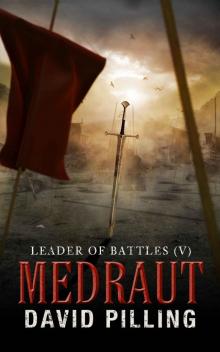 Medraut
Medraut Hardway
Hardway Holy Warrior
Holy Warrior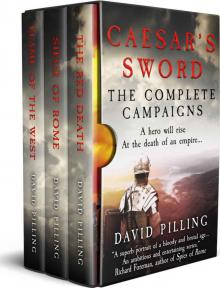 Caesar's Sword: The Complete Campaigns
Caesar's Sword: The Complete Campaigns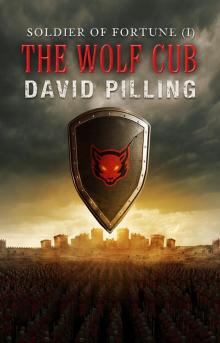 The Wolf Cub
The Wolf Cub Reiver
Reiver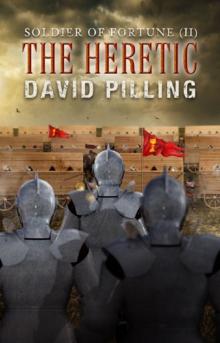 The Heretic
The Heretic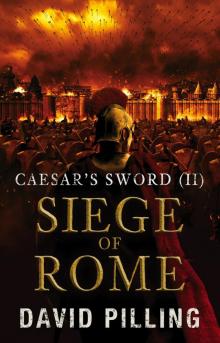 Siege of Rome
Siege of Rome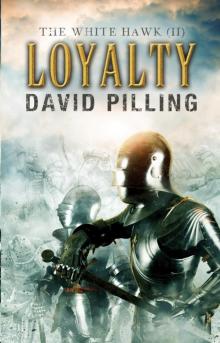 Loyalty
Loyalty The Path of Sorrow
The Path of Sorrow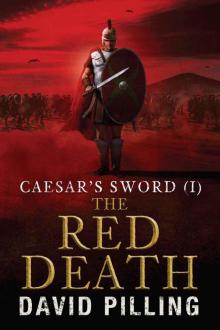 Caesar's Sword (I): The Red Death
Caesar's Sword (I): The Red Death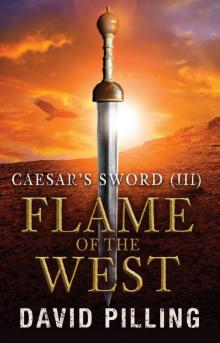 Flame of the West
Flame of the West The Best Weapon
The Best Weapon Sacrifice
Sacrifice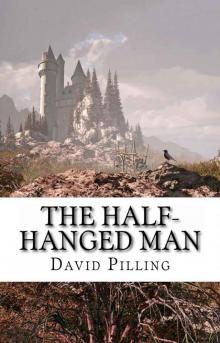 The Half-Hanged Man
The Half-Hanged Man